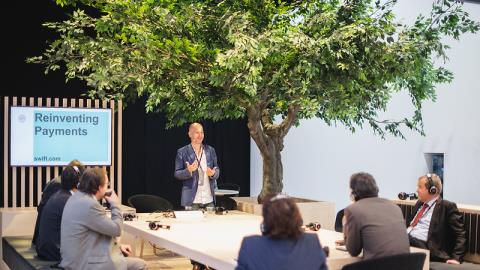As we navigate the complexities of wildfires, hurricanes, social upheavals, and the ongoing pandemic, the concluding day of Sibos 2020 centers on the theme of banking for humanity. This session emphasizes the influence of Environmental, Social, and Governance (ESG) criteria and the triple bottom line in fostering sustainable business practices.
A panel featuring representatives from ING, BNP Paribas Securities Services, Brown Brothers Harriman, and the University of Cambridge Institute of Sustainability Leadership examined the significance of integrating sustainability into banking. They discussed how financial institutions are shifting this critical agenda from the periphery to the core of their operations, effecting genuine change for people, the planet, and the economy.
Florence Fontan, head of company engagement and general secretary at BNP Paribas Securities Services, articulated that the effects of climate change are not a distant concern; rather, they will profoundly impact future generations. This realization has propelled her to advocate for urgent action at BNP Paribas, encouraging clients to invest in sustainable assets and initiatives.
From a regulatory perspective, Adrian Whelan, global head of regulation at Brown Brothers Harriman, echoed similar sentiments. He expressed confidence in the effectiveness of the Paris Agreement and EU regulations, asserting that these policies will compel banks and asset managers to recognize sustainability as a vital component of their business strategy.
The panelists posed an essential question: What constitutes sustainability? Although climate action has dominated discussions, they emphasized that ESG encompasses more than just environmental issues. For instance, the UN’s 17 Sustainable Development Goals cover a broad spectrum, of which only a few pertain directly to ecological concerns. Fontan stressed the interconnectedness of climate issues and social impacts, including how rising sea levels can lead to homelessness and a surge in environmental refugees.
Nina Seega, research director at the University of Cambridge Institute of Sustainability Leadership, advocated for the integration of sustainable development into corporate business models. Whelan expanded on this by describing sustainable finance as a term that can seem ambiguous, and critiqued the ESG acronym for potentially overshadowing social and governance factors.
Furthermore, Whelan pointed out that sustainability must be entrenched in corporate culture, highlighting concerns such as gender pay gaps and lack of diversity as indicators of inadequate governance. He noted that the EU’s forthcoming corporate disclosure regulations will require businesses to evaluate non-financial success metrics alongside traditional financial measures. This shift toward broader stakeholder accountability is essential for creating a more sustainable future.
Reflecting on BlackRock CEO Larry Fink’s recent letter to global CEOs regarding climate change and market risks, Whelan observed that asset managers are now reevaluating their roles: Are they solely focused on profit, or do they have a broader mission?
However, challenges remain, particularly for passive investors like BlackRock, whose portfolio management strategies complicate the screening of non-ESG assets. This has sparked debate within the industry about the sincerity of Fink’s commitment to sustainability.
Ultimately, it is evident that asset managers play a crucial role as change agents, and the private sector must invest in substantial infrastructure to elevate ESG priorities as momentum builds. This transformation is not a rapid process; successfully prioritizing sustainability will necessitate careful planning and a robust repository of ESG data to evaluate various products, leading to a unified dataset.
Leonie Schreve, global head of sustainable finance at ING, summarized the discussion by noting that the organization integrated sustainability into its commercial strategy back in 2012, driven by the conviction that sustainable business practices result in better overall outcomes.
